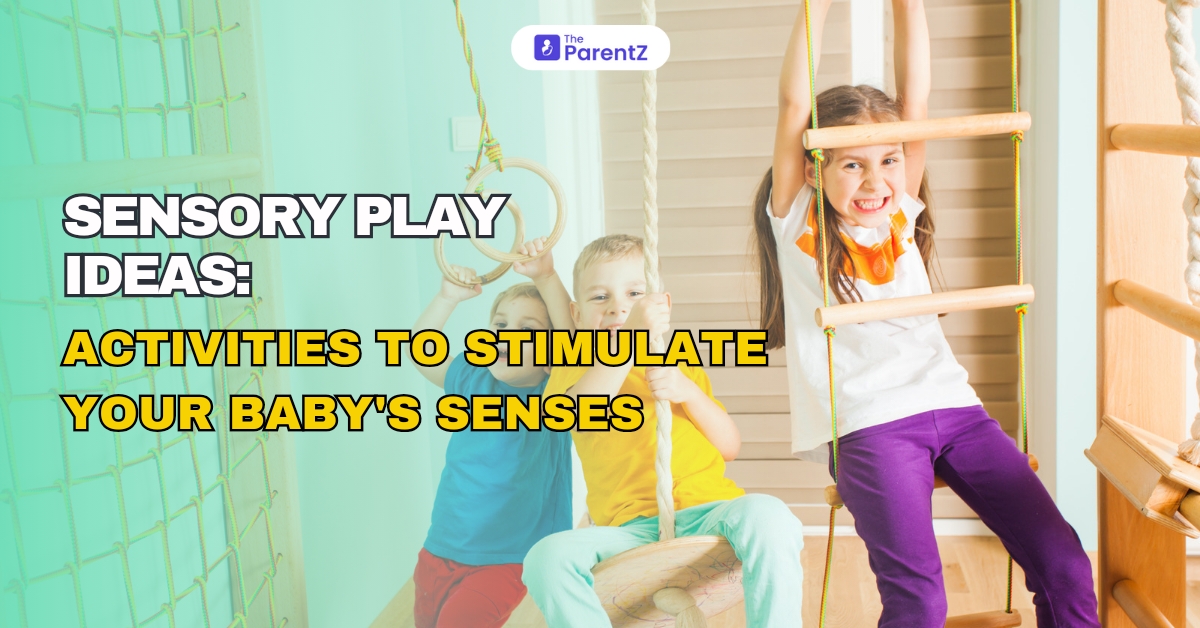Sensory play is crucial for a baby’s development, engaging their senses and helping them learn about the world around them. It supports cognitive growth, motor skills, social interaction, and language development. This article provides a comprehensive guide to sensory play activities that will stimulate your baby’s senses and contribute to their overall development.
Introduction to Sensory Play
Sensory play includes any activity that engages your baby’s senses: touch, smell, taste, sight, and hearing. These activities are designed to encourage exploration and natural curiosity, helping babies make connections and understand their environment. Sensory play can be simple and doesn’t require expensive toys—everyday household items can be just as effective.
Benefits of Sensory Play
Sensory play offers numerous benefits for your baby’s development:
- Cognitive Development: Encourages problem-solving, creativity, and critical thinking.
- Motor Skills: Enhances fine and gross motor skills through activities that involve grasping, pouring, and manipulating objects.
- Language Skills: Promotes language development as babies describe their experiences and learn new words.
- Social Skills: Encourages interaction and cooperation when played with others.
- Emotional Regulation: Helps babies learn to manage and express their emotions.
Sensory Play Activities
Tactile Activities
Tactile play involves activities that stimulate the sense of touch. These activities help babies explore different textures and develop fine motor skills.
- Sensory Bins: Fill a bin with rice, beans, or sand and add small toys or objects for your baby to explore. Supervise closely to prevent choking hazards.
- Water Play: Fill a shallow basin with water and provide cups, spoons, and toys for splashing and pouring.
- Play Dough: Homemade or store-bought play dough allows babies to squish, roll, and shape, enhancing their hand strength and dexterity.
- Texture Boards: Create boards with different materials like fabric, sandpaper, and cotton balls for your baby to touch and feel.
- Bubble Wrap: Let your baby pop bubble wrap for a fun and engaging tactile experience.
Auditory Activities
Auditory play stimulates the sense of hearing and helps develop listening skills.
- Musical Instruments: Provide simple instruments like drums, shakers, and xylophones for your baby to explore different sounds.
- Sound Bottles: Fill clear bottles with various materials like rice, beans, and bells, and let your baby shake them to hear different sounds.
- Singing and Rhymes: Sing songs and nursery rhymes, using hand movements and actions to engage your baby.
- Listening Walks: Take your baby for a walk and point out different sounds, such as birds chirping, cars passing, and leaves rustling.
- Noise-Making Toys: Offer toys that make sounds when pressed or shaken to encourage auditory exploration.
Visual Activities
Visual play engages the sense of sight and helps develop visual tracking and recognition skills.
- High-Contrast Books: Use books with high-contrast images, especially black and white, to capture your baby’s attention.
- Light Play: Shine a flashlight on the wall or ceiling and let your baby follow the light. You can also use a mirror to reflect light.
- Color Sorting: Provide colorful objects for your baby to sort and arrange, helping them recognize and differentiate colors.
- Bubble Play: Blow bubbles and let your baby watch them float and pop, enhancing their visual tracking skills.
- Mobile Toys: Hang a mobile above your baby’s crib or play area to stimulate their visual senses with movement and color.
Olfactory Activities
Olfactory play involves activities that stimulate the sense of smell, introducing your baby to different scents.
- Scented Play Dough: Add natural scents like vanilla, lemon, or lavender to play dough for a multi-sensory experience.
- Aromatherapy: Use baby-safe essential oils or herbs in a diffuser to introduce pleasant and calming scents.
- Herb Exploration: Provide fresh herbs like mint, basil, and rosemary for your baby to smell and explore.
- Scented Toys: Use toys infused with safe, natural scents to engage your baby’s sense of smell.
- Flower Smelling: Introduce your baby to different flowers and let them smell the various fragrances.
Gustatory Activities
Gustatory play engages the sense of taste, helping babies explore new flavors and textures.
- Flavor Exploration: Introduce safe, age-appropriate foods with different flavors, such as sweet, sour, salty, and bitter.
- Edible Finger Paints: Make edible finger paints using yogurt or pudding and let your baby create and taste their artwork.
- Fruit and Veggie Tasting: Provide small pieces of various fruits and vegetables for your baby to taste and explore.
- Flavor Ice Cubes: Freeze fruit juice or purees in ice cube trays and let your baby suck on them for a cool, flavorful treat.
- Cooking Together: Involve your baby in simple cooking activities, letting them taste and smell the ingredients.
Tips for Safe Sensory Play
While sensory play is beneficial, safety is paramount. Here are some tips to ensure safe play:
- Supervision: Always supervise your baby during sensory play to prevent choking or accidents.
- Age-Appropriate Activities: Choose activities suitable for your baby’s age and developmental stage.
- Non-Toxic Materials: Use non-toxic, baby-safe materials, especially for activities involving taste and smell.
- Small Parts: Avoid small objects that could pose a choking hazard.
- Cleanliness: Ensure that all materials and toys are clean to prevent infections.
Conclusion
Sensory play is an essential part of your baby’s development, offering a fun and engaging way to explore the world. By incorporating a variety of sensory activities into your baby’s routine, you can help them develop critical skills and foster their natural curiosity. Remember to prioritize safety and adapt activities to suit your baby’s interests and developmental stage. With these sensory play ideas, you can create enriching experiences that support your baby’s growth and learning









Be the first one to comment on this story.